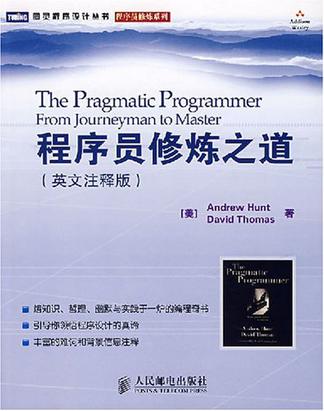-

Python Tutorial
最权威的 Python 教程,由 Python 作者 Guido van Rossum 主笔,有少许学院味道。中文电子版由刘鑫、李梦夷翻译。英文原稿网址:http://docs.python.org/tut/简体中文版网址:http://wiki.woodpecker.org.cn/moin/March_Liu/PyTutorial -

The Art of Computer Programming, Volume 4, Fascicle 0
Product Description This multivolume work on the analysis of algorithms has long been recognized as the definitive description of classical computer science. The three complete volumes published to date already comprise a unique and invaluable resource in programming theory and practice. Countless readers have spoken about the profound personal influence of Knuth’s writings. Scientists have marveled at the beauty and elegance of his analysis, while practicing programmers have successfully applied his “cookbook” solutions to their day-to-day problems. All have admired Knuth for the breadth, clarity, accuracy, and good humor found in his books. To begin the fourth and later volumes of the set, and to update parts of the existing three, Knuth has created a series of small books called fascicles, which will be published at regular intervals. Each fascicle will encompass a section or more of wholly new or revised material. Ultimately, the content of these fascicles will be rolled up into the comprehensive, final versions of each volume, and the enormous undertaking that began in 1962 will be complete. Volume 4, Fascicle 0 This fascicle introduces what will become by far the longest chapter in The Art of Computer Programming, a chapter on combinatorial algorithms that will itself fill three full-sized volumes. Combinatorial algorithms, informally, are techniques for the high-speed manipulation of extremely large quantities of objects, such as permutations or the elements of graphs. Combinatorial patterns or arrangements solve vast numbers of practical problems, and modern approaches to dealing with them often lead to methods that are more than a thousand times faster than the straightforward procedures of yesteryear. This fascicle primes the pump for everything that follows in the chapter, discussing first the essential ideas of combinatorics and then introducing fundamental ideas for dealing efficiently with 0s and 1s inside a machine, including Boolean basics and Boolean function evaluation. As always, the author’s exposition is enhanced by hundreds of new exercises, arranged carefully for self-instruction, together with detailed answers. About the Author Donald E. Knuth is known throughout the world for his pioneering work on algorithms and programming techniques, for his invention of the TeX and Metafont systems for computer typesetting, and for his prolific and influential writing. Professor Emeritus of The Art of Computer Programming at Stanford University, he currently devotes his time to the completion of these fascicles and the seven volumes to which they belong. -

程序员修炼之道
《程序员修炼之道》适合各层次软件开发人员阅读,也适合高等院校计算机专业学生和教师阅读。 -

正则表达式必知必会
正则表达式是一种威力无比强大的武器,几乎在所有的程序设计语言里和计算机平台上都可以用它来完成各种复杂的文本处理工作。本书从简单的文本匹配开始,循序渐进地介绍了很多复杂内容,其中包括回溯引用、条件性求值和前后查找,等等。每章都为读者准备了许多简明又实用的示例,有助于全面、系统、快速掌握正则表达式,并运用它们去解决实际问题。 本书适合各种语言和平台的开发人员。 -

编写高质量代码
本书是C++程序员进阶修炼的必读之作,包含的全部都是C++编码的最佳实践,从语法、编码规范和编程习惯、程序架构和设计思想等三大方面对C++程序和设计中的疑难问题给出了经验性的解决方案,为C++程序员编写更高质量的C++代码提供了150条极为宝贵的建议。每个问题都来自于实践,都极具代表性,本书不仅以建议的方式正面为每个问题给出了被实践证明为十分优秀的解决方案,而且还从反面给出了被实践证明为不好的解决方案,从正反两个方面进行了分析和对比。 全书在逻辑上一共分为三个部分:语法部分涵盖C++从C语言继承而来的一些极为重要但又极容易被误解和误用的一些语法特性,从C语言到C++的改变,以及内存管理、类、模板、异常处理、STL等方面的内容;编码习惯和编程规范部分则主要讨论了如何提高程序的正确性、可读性、程序性能和编码效率方面的问题;程序架构和思想部分则从更高的高度对C++程序设计思维和方法进行了审视,给出了一些颇具价值的观点和最佳实践。 这是一本关于如何提高C++程序设计效率与质量的工具书,希望书中的每条建议都能引起你的思考,对于有难度的内容,建议大家消化理解,切勿死记硬背,同时也希望大家能悟出更好的解决方案。希望本书中的每条建议所传递的思想和理念能够渗透到大家的编码实践中,进而帮助大家真正具备编写高质量C++代码的能力。 -

C++ Primer Plus
C++ Primer Plus, Sixth Edition New C++11 Coverage C++ Primer Plus is a carefully crafted, complete tutorial on one of the most significant and widely used programming languages today. An accessible and easy-to-use self-study guide, this book is appropriate for both serious students of programming as well as developers already proficient in other languages. The sixth edition of C++ Primer Plus has been updated and expanded to cover the latest developments in C++, including a detailed look at the new C++11 standard. Author and educator Stephen Prata has created an introduction to C++ that is instructive, clear, and insightful. Fundamental programming concepts are explained along with details of the C++ language. Many short, practical examples illustrate just one or two concepts at a time, encouraging readers to master new topics by immediately putting them to use. Review questions and programming exercises at the end of each chapter help readers zero in on the most critical information and digest the most difficult concepts. In C++ Primer Plus, you'll find depth, breadth, and a variety of teaching techniques and tools to enhance your learning: * A new detailed chapter on the changes and additional capabilities introduced in the C++11 standard * Complete, integrated discussion of both basic C language and additional C++ features* Clear guidance about when and why to use a feature* Hands-on learning with concise and simple examples that develop your understanding a concept or two at a time* Hundreds of practical sample programs* Review questions and programming exercises at the end of each chapter to test your understanding* Coverage of generic C++ gives you the greatest possible flexibility* Teaches the ISO standard, including discussions of templates, the Standard Template Library, the string class, exceptions, RTTI, and namespacesTable of Contents 1: Getting Started with C++ 2: Setting Out to C++ 3: Dealing with Data 4: Compound Types 5: Loops and Relational Expressions 6: Branching Statements and Logical Operators 7: Functions: C++'s Programming Modules 8: Adventures in Functions 9: Memory Models and Namespaces 10: Objects and Classes 11: Working with Classes 12: Classes and Dynamic Memory Allocation 13: Class Inheritance 14: Reusing Code in C++ 15: Friends, Exceptions, and More 16: The string Class and the Standard Template Library 17: Input, Output, and Files 18: The New C++11 Standard A Number Bases B C++ Reserved Words C The ASCII Character Set D Operator Precedence E Other Operators F The stringTemplate Class G The Standard Template Library Methods and Functions H Selected Readings and Internet Resources I Converting to ISO Standard C++ J Answers to Chapter Reviews